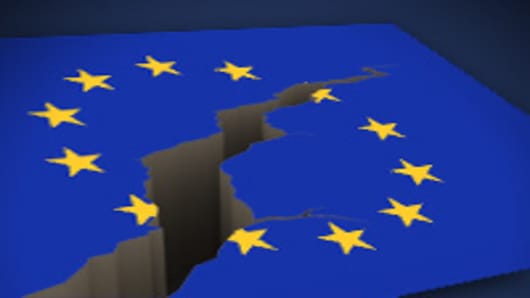“You are in your car, driving on an icy night. You are trying to ease your way up a steep hill. Suddenly, your vehicle stops, then slowly it begins to slide down the hill… backwards. Nothing you try – accelerator, brake, turn, coast – is able to arrest your decent. You slip down the hill with ever increasing speed. As you go, the hill gets steeper, and steeper and steeper. You realize that an uncontrollable force has taken control of your destiny…”
These are the words Carl Weinberg, the chief economist at High Frequency Economics, uses in a market note to describe to plight of the euro zone following Friday’s disappointing European Union summit which saw a "euro plus pact" deferred until June due to technical factors.
Those technical factors where public opinion in Germany and Finland as witnessed by another election loss for Angela Merkel in regional elections over the weekend in yet another sign that neither those being bailed out nor those doing the bailing can sell the implications of the euro zone crisis to voters.
Following the failure to reach an agreement at the summit, news began to leak of a new facility from the European Central Bank aimed at boosting liquidity in a deal that has been described by an ECB source to Reuters as "tailor-made for Irish banks."
Weinberg said there is nothing on the table that can stop the euro zone falling into crisis.
“Not only is there no solution in hand, but there is no inkling that any idea on the table at this summit could plausibly avert a default on substantial portions of euro land’s sovereign debt,” he wrote.
“Lending money to already over-borrowed nations does not help or fix them. Also, no plan exists for strategies to cope with the fallout of a sovereign default should one occur,” Weinberg added.
Others are less pessimistic and see positives in the plan that euro zone leaders are in broad agreement over.
“These agreements show joint political resolve to combat the financial and fiscal issues of member countries,” Frank Engels, from Barclays Capital in Frankfurt, wrote in a research report.
“These reforms could have been more ambitious, such as in terms of the degree of automaticity of the sanction regime etc.," Engels wrote. "However, they address several weaknesses of the current framework and we regard them as a useful first step towards a closer coordination of economic policies within the euro area.”
Weinberg, though, believes Ireland and Greece are in receivership and are likely to be followed by Portugal but does believe there remain options for euro zone policy makers.
“Any of these three nations could default on their sovereign debt at any moment,” he wrote.
“If permitted to do so, the EFSF/ESM could support troubled countries by facilitating restructuring of their debts into 30 year repayments instead of the current debt service ‘mountains’ of six or seven years with huge cash requirements,” Weinberg added.
“That would fix the problem for real with little net cash. Instead the EU insists that the role of the EFSF is limited to extending new loans to already over borrowed nations. That is bad policy that makes a bad problem worse,” he wrote.



